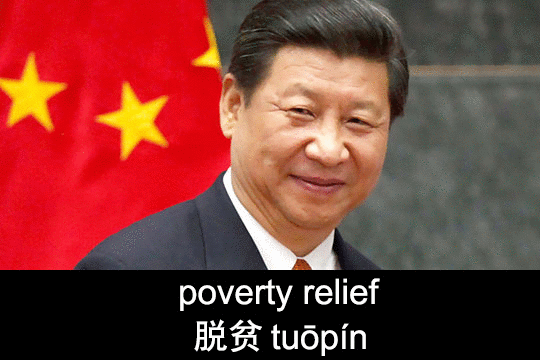Will poverty relief be Xi Jinping’s legacy? – China’s latest top news
Jeremy Goldkorn’s selection of the top stories from China on August 23, 2017. Part of the daily The China Project newsletter, a convenient package of China’s business, political, and cultural news delivered to your inbox for free. Subscribe here.

Poverty relief: Xi’s legacy?
As the American new media and commentariat were preparing their opinion pieces on Donald Trump’s deranged rant at a campaign-style rally in Phoenix on the evening of August 22, People’s Daily editors were hard at work on their top story for August 23 (in Chinese). It’s about the English and French versions of Chinese President Xi Jinping’s book on poverty alleviation titled Up and Out of Poverty, which you can pre-order on Amazon. Xinhua News Agency followed with an English story about the book’s release at the Beijing International Book Fair currently taking place in the capital.
This is not a one-off propaganda message:
- A focus on poverty alleviation has been one of the key features of Xi’s tenure as China’s leader, along with the anti-corruption campaign, military reform, financial regulation, an assertive foreign policy, and growing repression of civil society voices.
- In March we noted that eradicating poverty has been a core theme in state propaganda and an explicit priority for the Party throughout 2017, and that the government had set 2020 as the target year to finish building a “moderately prosperous society” — in other words, to lift the entire population out of poverty.
If Xi’s government can indeed eradicate poverty in China by 2020 and continue to grow the country’s economy and keep it stable, history may be inclined to forget the more unpleasant aspects of his rule, and remember Xi as the great alleviator of poverty.
But Xi faces formidable obstacles, including:
- Growing household debt — adding to worries about corporate and government debt;
- The possibility that China might get old before it gets rich;
- Tensions with many of China’s neighbors;
- Environmental nightmares;
- An international situation made increasingly unstable by — and here I abandon political correctness — the lunatic in the White House.
Class in China
In 2015, Miao Ying 缪莹 at Cnpolitics.org published an interview (in English and Chinese) with scholar David Goodman about his book Class in Contemporary China. If you ask 10 economists, or 10 businesspeople, to define China’s middle class, you’ll get 10 different answers, often rather fuzzy. Goodman, however, is refreshingly precise about his definitions, for example:
- “The dominant class are those who own and control wealth and power. The middle class are those who owe their intermediate position in the hierarchies of wealth, status, and power to their possession of skill, knowledge, expertise, and experience. The subordinate classes are those whose wealth and status rests only on their manual labor.”
- “The myth of the middle class — that any individual can better themselves in terms of wealth, status, and power through their own efforts — is very pervasive in most contemporary societies. The evidence for this, though, is very limited.”
- “Women’s social status does on the whole get subverted by their closest men or hidden behind them.”
- “The middle class are state reinforcing… There is a widespread expectation in the rest of the world that a growing middle class will necessarily lead to liberal democracy of the Anglo-American kind(s) in China. I beg to differ.”
Free speech in China and the U.S.
One in a Billion is a website and podcast run by broadcaster Mable Chan 陈美宝 that seeks to amplify the voices of young Chinese in the U.S. and China. The most recent episode of the podcast features “Chinese and Americans who have reflected on their cultural identity and their right to speak,” in response to a controversial speech by Chinese student Yang Shuping 杨舒平 (see The China Project’s report) at the University of Maryland. You can listen to the podcast here.
In Israel: Chinese students and Wahaha artificial intelligence deal
The Jerusalem Post reports that drawn by high-tech expertise, “the influx of Chinese students at Israeli universities has been growing steadily in recent years.”
- The University of Haifa “currently boasts some 200 Chinese students…compared to 20 in 2013.”
- In March, the president of Haifa University accompanied Israeli Prime Minister Benjamin Netanyahu on a state visit to China and, in cooperation with the Hangzhou Wahaha Group and the Institute of Automation at the Chinese Academy of Sciences, signed a “$10 million deal that finalized the construction of three Israeli-Chinese artificial intelligence technology centers in Haifa, Hangzhou and Beijing.”
- During the 2016–2017 academic year, the Technion–Israel Institute of Technology had “117 full-time Chinese students, and 177 Chinese students enrolled in its summer school of engineering.”






